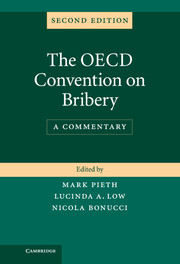Book contents
- Frontmatter
- Contents
- Notes on Contributors
- Foreword
- Acknowledgements
- Abbreviations
- Part I Introduction
- Part II Commentary
- Article 1 The Offence of Bribery of Foreign Public Officials
- Article 2 The Responsibility of Legal Persons
- Article 3 Sanctions
- Article 3(3) Seizure and Confiscation
- Article 4 Jurisdiction
- Article 5 Enforcement
- Article 6 Statute of Limitations
- Article 7 Money Laundering
- Article 8 Accounting
- Articles 9–11 International Co-operation
- Article 12 Monitoring and Follow-up
- Articles 13–17 Final Provisions
- Part III The Convention in Practice
- Annex OECD Documents
- Consolidated Bibliography
- Index
- References
Article 12 - Monitoring and Follow-up
from Part II - Commentary
Published online by Cambridge University Press: 05 March 2015
- Frontmatter
- Contents
- Notes on Contributors
- Foreword
- Acknowledgements
- Abbreviations
- Part I Introduction
- Part II Commentary
- Article 1 The Offence of Bribery of Foreign Public Officials
- Article 2 The Responsibility of Legal Persons
- Article 3 Sanctions
- Article 3(3) Seizure and Confiscation
- Article 4 Jurisdiction
- Article 5 Enforcement
- Article 6 Statute of Limitations
- Article 7 Money Laundering
- Article 8 Accounting
- Articles 9–11 International Co-operation
- Article 12 Monitoring and Follow-up
- Articles 13–17 Final Provisions
- Part III The Convention in Practice
- Annex OECD Documents
- Consolidated Bibliography
- Index
- References
Summary
Monitoring and Follow-up
The Parties shall co-operate in carrying out a programme of systematic follow-up to monitor and promote the full implementation of this Convention. Unless otherwise decided by consensus of the Parties, this shall be done in the framework of the OECD Working Group on Bribery in International Business Transactions and according to its terms of reference, or within the framework and terms of reference of any successor to its functions, and Parties shall bear the costs of the programme in accordance with the rules applicable to that body.
Official Commentaries
Article 12 – Monitoring and Follow-up
The current terms of reference of the OECD Working Group on Bribery which are relevant to monitoring and follow-up are set out in Section VIII of the 1997 OECD Recommendation.They provide for:
i) receipt of notifications and other information submitted to it by the [participating] countries;
ii) regular reviews of steps taken by [participating] countries to implement the Recommendation and to make proposals, as appropriate, to assist [participating] countries in its implementation; these reviews will be based on the following complementary systems:a system of self evaluation, where [participating] countries' responses on the basis of a questionnaire will provide a basis for assessing the implementation of the Recommendation;a system of mutual evaluation, where each [participating] country will be examined in turn by the Working Group on Bribery, on the basis of a report which will provide an objective assessment of the progress of the [participating] country in implementing the Recommendation;
examination of specific issues relating to bribery in international business transactions;. . .
provision of regular information to the public on its work and activities and on implementation of the Recommendation.
- Type
- Chapter
- Information
- The OECD Convention on BriberyA Commentary, pp. 534 - 576Publisher: Cambridge University PressPrint publication year: 2013

